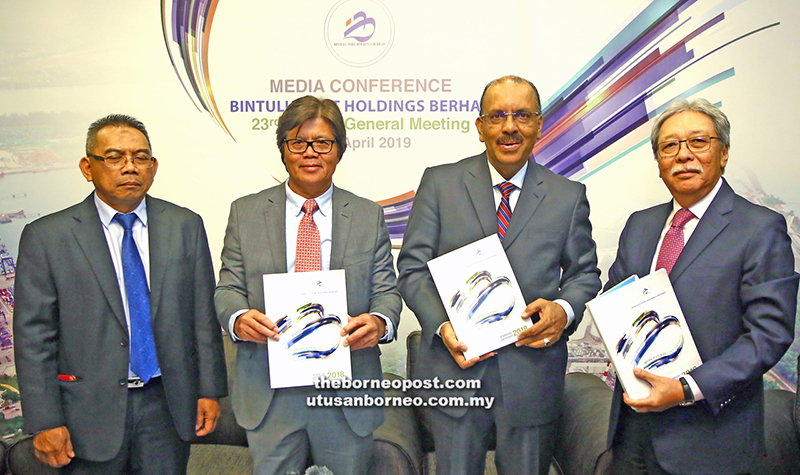 |
Mohammad Medan (second left) and Ali (second right) in a photo-call with BPHB Board of Directors
chairman Datuk Nasarudin Md Idris (right) and BPHB company secretary Abu Bakar Hussaini. — Photo by Muhammad Rais Sanusi
KUCHING: The 23rd annual general meeting (AGM) of Bintulu Port Holdings Bhd (BPHB) yesterday saw six agenda tabled for shareholders’ approval.
BPHB chief executive officer Datuk Mohammad Medan Abdullah said all six agenda were adopted as resolutions by the shareholders.
He said among them were on the accounts and directors’ fees and benefits, and the re-election of directors by rotation pursuant to the company’s association, Another resolution was the re-appointment of Messrs Ernst & Young as the group’s auditor.
“All resolutions had been carried by the shareholders, by proxies and who were in attendance at the AGM that we just had,” he said during a press conference held after the AGM at a hotel here yesterday.
Mohammad Medan said in terms of performance, BPHB was on track in putting its strategies in place and to not over-rely on one cargo as it had in the past, which was liquefied natural gas (LNG).
“We have diversified our cargo mix and our sources of revenues and we are on track to achieve that.
“In fact, we have put investment in our new port, Samalaju Industrial Port, and to build our capacity and to cater to the requirements of Samalaju Industrial Park investors,” he said.
Meanwhile, BPHB chairman Tan Sri Dr Ali Hamsa said the group, which comprises three wholly-owned subsidiaries – Bintulu Port Sdn Bhd (BPSB), Biport Bulkers Sdn Bhd (BBSB) and Samalaju Industrial Port Sdn Bhd (SIPSB) – registered a slight decline of 3.9 per cent in group’s overall operational performance last year versus 2017, primarily due to lower shipment volume of LNG caused by disruptions of gas supply to Bintulu LNG plant.
“The group also handled a total throughput of 48.34 million tonnes in cargo in 2018, in comparison with 50.28 million tonnes in 2017,” he said.
Nevertheless, Ali said the non-LNG cargo sector, particularly palm oil, container and dry bulk, had shown remarkable performance with an overall growth of 6.6 per cent.
He added that 80 per cent of the group’s trade originated from and were destined to the Asean 5 (Malaysia, Indonesia, Thailand, Philippines, Singapore), Japan, China, Korea, Taiwan and India.
He described Bintulu Port as Malaysia’s third largest port in terms of cargo volume handled, and the biggest in Sarawak and Sabah.
He also said that non-LNG sector cargo throughput made up almost 51 per cent of the total cargo throughput last year, versus the preceding year during which the LNG sector contributed 54 per cent.
“In this regard, SIPSB continued to show positive contribution with an outstanding 59.7 per cent increase in cargo throughput in 2018. Dependency on LNG’s contribution to the group’s revenue and cargo throughput is progressively on the downtrend and is expected to further decrease over the coming years with the steady increase in Samalaju cargo volume and other non-LNG cargo,” he said.
This cargo rebalancing, said Ali, reflected the group’s diligence towards promoting growth of non-LNG cargo; thereby diversifying from an over-reliance on a single cargo.
“The group registered a turnover of RM686.14 million for the financial year ended Dec 31, 2018 – an increase of 0.93 per cent, or RM6.32 million, in comparison with 2017’s turnover of RM679.82 million,” he said.
Meanwhile, Ali also said in order to address critical changes in the industry as well as the economic and business landscape, a new way of thinking and doing things would be needed.
“Ongoing efforts to challenge the ingrained culture of doing ‘Business As Usual’ have been initiated by Mohammad Medan, and have cascaded down to every level of management.
“The group will continue to focus on the inculcation of its corporate values to all Bintulu Port Group employees to shape a high performance culture throughout the organisation in order to realise the group’s aspiration of becoming a world-class port operator,” said Ali.
Source: The Borneo Post